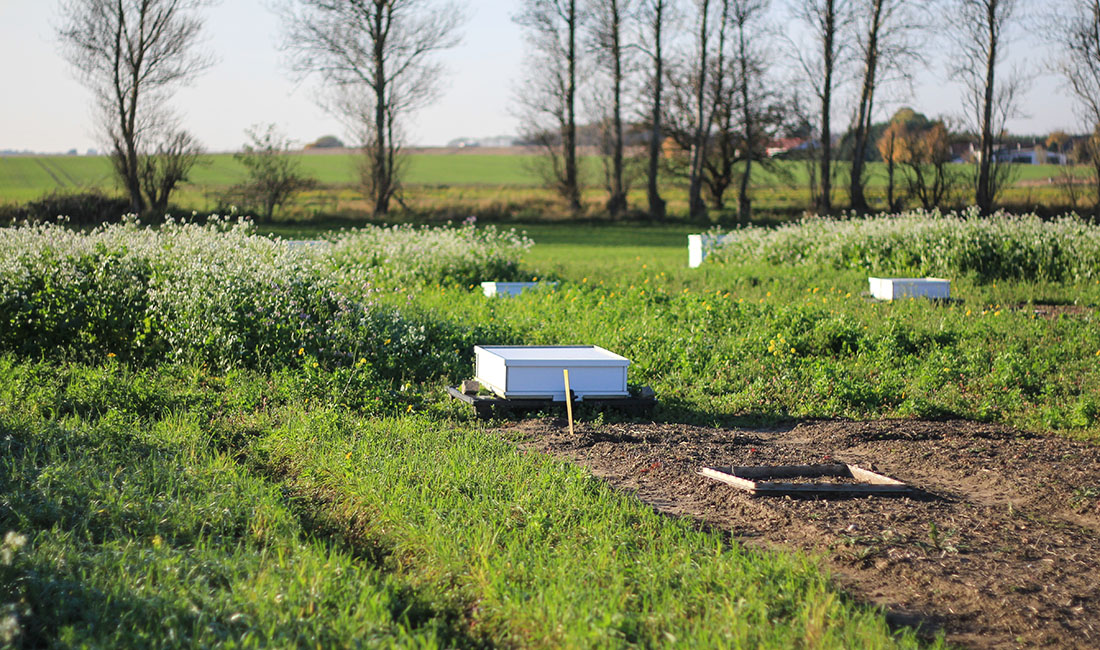Climate Change Mitigation and Sustainable Soil Management

The most imminent, impactful and complex environmental problem we are facing today is climate change. The three main greenhouse gases associated with agricultural production are carbon dioxide (CO2), nitrous oxide (N2O) and methane (CH4). Net exchange of CO2 in agricultural fields and emissions of N2O are heavily affected by soil and nutrient management in agricultural fields. To make our food systems sustainable we must develop better ways to manage soils, crops and fertiliser inputs in agriculture that result in reduced emissions of greenhouse gases, while maintaining productivity and avoiding any detrimental environmental effects such as nutrient leaching.
The vision of the Climate Change Mitigation and Sustainable Soil Management research group is to:
- Improve our understanding of the soil biogeochemical processes that lead to nutrient losses and emissions of greenhouse gases from agricultural fields.
- Develop mitigation technologies and field management strategies that can be used to reduce emissions of greenhouse gases and sequester soil carbon while maintaining crop productivity.
- Develop approaches and methodologies that can be used to assess environmental benefits and impacts of mitigation technologies and soil management strategies.
The methods developed and applied to pursue these visions include:
- Laboratory incubations, mesocosm systems and field trials to measure nutrient transformations, greenhouse gas emissions, as well as soil conditions relevant for understanding the involved processes.
- Field experiments to test various mitigation technologies for reducing N2O and other environmental emissions as well as increasing soil carbon sequestration.
- Mechanistic modelling approaches to simulate the processes responsible for the transformations and losses, including model development, as well as model calibration and validation on experimental data use of the models to simulate the effect of various mitigation technologies and management strategies
- Life cycle assessment methodology to assess the environmental sustainability of mitigation technologies and soil, crop and fertilizer management strategies.
2019-2024: LEX4BIO - Optimizing Bio-based Fertilisers in Agriculture – Knowledgebase for New Policies, funded by the EU H2020 RUR-08 call
2020-2025: NATEF: Nationale emissionsfaktorer for lattergas fra gødninger og sædskifter. Klimaforskningsprogrammet.
2020-2025: KLIMINI: Klima- og miljøeffekter af nitrifikationshæmmere. Klimaforskningsprogrammet.
2020-2025: CatCap: Efterafgrøder og grøngødninger for kulstof-lagring of reduktion af lattergas emission. Klimaforskningsprogrammet.
2019-2025: Klimagræs – Dairy Pasture Rotations for Climate Mitigation, funded by the Danish Ministry of Food Agriculture and Fisheries Climate Research Program.
2020-2024: FertiCycle – New Bio-based Fertilisers from Organic Waste Upcycling, funded by EU H2020 Marie S. Curie European Training Network program, Project principal coordinator, Total budget 31 MDKK 9.1 MDKK for PLEN, group main applicant.
2020-2024: LessN - Lavemissionssædskifter til målrettet kvælstofindsats, funded by the Danish Ministry of Food Agriculture and Fisheries Climate Research Program.
2020-2024: STABIL: Reduktion af drivhusgasudledninger og øget kulstoflagring i jord via stabilisering af gødningsfibre som biochar. GUDP.
2021-2026: AgPro4CSA: Sustainable management of agriculture sources for development of climate-smart agricultural practices. MSCA individual fellowship.
2022-2026: Mitichar: Mitigation of climate impacts from plant production with biochar from straw and biogas digestates. Innovation foundation Denmark, AgriFoodTure road map.
2021-2025: WalNUT - Closing waste water cycles for nutrient recovery. EU Horizon Europe.
2021-2026: RootAccess: A novel field facility maximizing root zone access for research on root and climate interactions. Novo Nordisk Foundation, Infrastructure Programme.
2022-2024: ZeroEF: Zero Emission Fertilizer. Innovation foundation Denmark, AgriFoodTure road map.
2022-2024: LowHigh: Low emissions and high energy production in manure handling chains. Innovation foundation Denmark, AgriFoodTure road map.
2022-2026: KortDrænN2O: Kortlægning af lattergas emission fra dårligt drænede mineraljorde. Bedriftsudviklingsprogrammet BUP.
2022-2026: KlimaGødning: Model for klimapåvirkning fra gødningsanvendelse i dansk landbrug. Bedriftsudviklingsprogrammet BUP.
2023-2026: NyMarkModel – Kvælstofudvaskning og ændringer i jordens kulstofpulje, funded by the Danish Ministry of Food Agriculture and Fisheries Climate Research Program.
2022-2035: LandCraft: Pioneer center for landscape research in sustainable agricultural futures. Pioneer center.
2023-2027: DeliSoil: Delivering Soil improvers through improved recycling and processing solutions for food industry. EU Horizon Europe.
2023-2026: Foliar N: Foliar N fertilization: A path to green agricultural production. Funded by Independent Research Fond Denmark.
2023-2026: Optichar: Optimization of biochar properties for maximum reduction of N2O emissions from agricultural soil. Funded by Independent Research Fond Denmark.
2024-2027: FoFE: Foliar fertilization for a more efficient, environmental, and climate friendly crop production (Innovation foundation Denmark, AgriFoodTure road map.
2024-2027: ResidueN2O: New emission factors for nitrous oxide from crop residues Bedriftsudviklingsprogrammet BUP2.
2024-2029: BiokulLTE: langvarige forsøg med biokul på dansk landbrugsjord. Agricultural Agency.
2024-2029: SmartField: An innovative climate platform for reduction of Danish agricultural N2O emissions. NNF foundation
2002-present: CRUCIAL: Closing the Rural-Urban Nutrient Cycle - Investigations through Agronomic Long-term experiments
1965-present: LTNDT: The Long-term Nutrient Depletion Trial (Udpiningsmarken)
Researchers
| Navn | Titel | Telefon | |
|---|---|---|---|
| Andreas Brændholt | Adjunkt | +4535333709 | |
| Camille Nunes Leite | Ph.d.-stipendiat | +4535329219 | |
| Celine Rendboe Grønning | Ph.d.-stipendiat | +4535325636 | |
| Elisabeth Ledgaard Andersen | Ph.d.-stipendiat | ||
| Jonathan Hessner Lindhardt | Postdoc | ||
| Lars Stoumann Jensen | Professor | +4535333470 | |
| Line Vinther Hansen | Postdoc | +4535334484 | |
| Maddie Vinkler Schwartzkopff | Postdoc | +4535332600 | |
| Maja Karolina Rydgård | Postdoc | +4535321023 | |
| Maria Skovgaard Andersen | Videnskabelig assistent | +4535324804 | |
| Marie Louise Bornø | Tenure Track Adjunkt | +4535334497 | |
| Saadat Malghani | Postdoc | +4535333750 | |
| Sander Bruun | Professor | +4535333481 | |
| Tobias Klöffel | Postdoc | +4535332016 |

